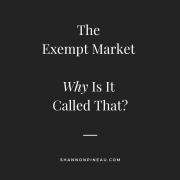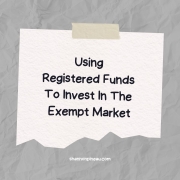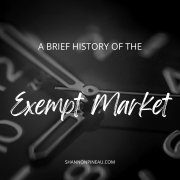If you know the answer to this question, you will have a clearer picture about what you can and cannot do in the Exempt Market.
Let’s start with the majority of people who would generally be considered “average” investors. They usually have varying levels of investing experience and are also known as…
ELIGIBLE INVESTORS
To be “eligible” you either have to meet the net worth or annual income requirements:
– Your net assets have to be greater than $400,000 and or your annual income for the last 2 years has to be greater than $75,000 before taxes.
– If your income doesn’t quite make it alone, you can combine with your spouse and then your combined annual income has to be greater than $125,000 for the last 2 years.
If you meet one or more of these requirements, then you are an “eligible” investor. And being eligible means, you can invest a certain amount in the Exempt Market.
But just because you can, doesn’t always mean you should so please read on after I describe the next type of investor…
ACCREDITED INVESTORS
To be considered an “accredited” investor, you still have to meet one or more similar types of requirements as above but they are considerably higher.
– In this case, your financial assets have to be greater than $1 million, and notice that’s financial assets and not net assets. Financial assets are tangible liquid assets and don’t include property.
– If you want to include things like property and rely on your net assets for accredited status, your net assets must exceed $5 million.
– For the income requirements your annual income must be greater than $200,000 for the last 2 years and if you combine with a spouse it must be greater than $300,000 annual income for the last 2 years.
SO WHAT DOES ALL OF THIS MEAN TO YOU IN THE PRIVATE INVESTING WORLD?
Here is a quick summary:
– If you are not “eligible” – meaning that you don’t meet any of the requirements of an eligible investor, you can still potentially invest in the Exempt Market but it has to be $10,000 or less in a 12 month period.
– If you are “eligible” you can invest $10,000 or more in the Exempt Market but you can’t exceed $100,000 in any 12 month period.
(Before you invest in anything though, you would meet with a Dealing Representative, such as myself, and decide if private investing in the Exempt Market is a good fit for you. We would consider things like your age, your time horizon, your financial objectives and your risk tolerance to determine if these types of investments are “suitable” for your portfolio. And if they are, we would also take various things into consideration to determine how much to allocate there. There are certainly exceptions but as a general rule, it is not advisable to exceed 10% of your net financial assets in the Exempt Market. That percentage can also be a lot less depending on your current financial situation and experience in private investing.)
– If you are “accredited” you are not subject to these caps and limitations. The overall assumption is that you achieved accredited status by having a good understanding of how to invest your money and you can generally invest it however you like.
I will say though that just because an investor is accredited, doesn’t necessarily mean they should exceed the allocation guidelines that are in place for an eligible investor. There is a lot of discussion to be had before any investment is ever made because there is a lot to take into consideration. Particularly things like previous experience in the Exempt Market and a full understanding of the risks involved.
TO SUM UP
Private investing is still relatively new to “eligible” and “accredited” investors alike so it’s important to get all the information you need before you decide if it is right for you.
I hope this post was helpful for you to figure out what type of investor you are. And of course, there are much more official definitions and explanations to describe these terms and I will link to them below. The links are to a great website that I visit often as they present excellent discussion around the topics as well.
Definitions:
I really appreciate you reading my post! If you would like to talk further, with no obligation, please contact me today.

Shannon Pineau
Exempt Market Dealing Representative
E: spineau@sentinelgroup.ca
C: 403-872-4010









